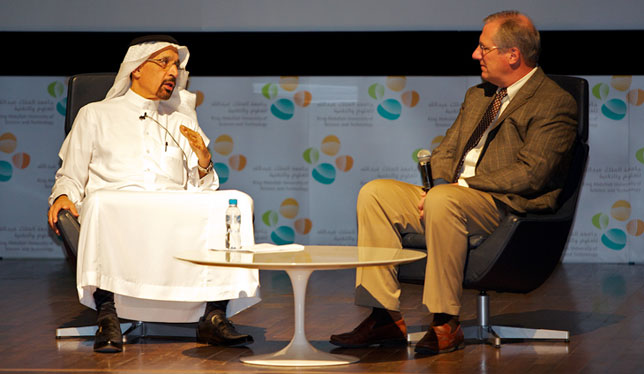Khalid Al-Falih WEP Keynote Address Highlights KAUST-Saudi Aramco Spirit of Innovation

Khalid Al-Falih and Prof. James Calvin
Khalid Al-Falih, Saudi Aramco President and CEO, spoke on January 12 at the opening of the 5th annual Winter Enrichment Program (WEP) at the KAUST campus.
In his keynote address to KAUST faculty, students, staff, and members of the community, Al-Falih outlined his own and Saudi Aramco's deep connections with KAUST. He also discussed the University and Saudi Aramco's roles in directing science, technology, and innovation to "meet challenges and seize opportunities" for the benefit of the Kingdom and the world.
Al-Falih described his journey with KAUST from the University's conception in 2006, when he received a call to assist with building a "flagship research university for Saudi Arabia." Although his initial response was exhilaration, he remembered asking himself: "How do you do the impossible" – build a "fully-fledged, global research university…in three years?"
However, as he became closely involved with KAUST, he realized that the University "was not just a construction project, but a gift" – an opportunity to construct a cutting-edge research institution "comparable to the world's elite universities…laying the foundation for the Kingdom of the future."
"KAUST is a new institution with a global role…but at the same time it has deep roots in an earlier era, when our region led the way in progress and innovation," Al-Falih noted. He described the impact of the Bayt al-Hikma, "the world's first great House of Wisdom established more than a millennium ago" in Baghdad, and how its scientists and researchers' work "forever changed the world in which they lived." KAUST, the new House of Wisdom, has the same mission, he said.

Khalid Al-Falih
Al-Falih noted Saudi Aramco and KAUST are leaders in transforming the Kingdom into a knowledge-based economy. Both have a "common thread" of "impactful research, technology, and talent, which are necessary to spur economic growth and diversification, create jobs, and address challenges" facing Saudi Arabia and the world.
Saudi Aramco currently counts more than 100 KAUST alumni as employees, and relies on the University as an important R&D partner. "KAUST serves as an example of the power of collaboration across disciplines and institutions," stated Al-Falih.
He noted an example of a team of eight KAUST graduates who are now Saudi Aramco employees. These men and women from four continents "designed and developed a robot to inspect pipelines and hard-to-reach operational assets like beams and elevated vessels," Al-Falih explained. The team members represent the best of both KAUST and Saudi Aramco: people who use their knowledge of science and technology to better the world by "combining their respective strengths, expertise, and insights," he said.

Khalid Al-Falih
This spirit of collaboration is one of KAUST's main strengths, Al-Falih said, as "innovation is not just a matter of the most powerful electron microscopes or most sophisticated nanotechnology clean room; it's about scientists and researchers collaborating to turn abstract ideas and theories into transformative solutions."
KAUST and its work with academic and industrial partners are a bridge "to an inspirational past, and will be a bridge to the future," Al-Falih stated. "I believe also that [the University] can bridge human understanding – an element that is essential to the spirit of open collaboration that drives innovation."

